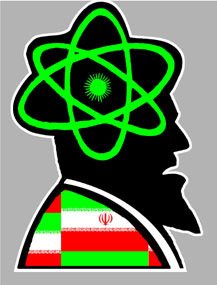History is littered with decisions that have to be made between between bad choices and worse choices. While differentiating between good and evil is usually an easy task, choosing the lesser of evils is considerably less so, and extrapolating the potential repercussions of our decision often leads to paralysis - which is often the worst decision of all. As the old saying goes, "not to decide is to decide."
The powder keg we know as the Middle East is on the cusp of becoming infinitely more dangerous as the most belligerent loose cannon, in a region known for loose cannons, is hell-bent upon delivering his medieval religious bloodlust into the nuclear age. To even suspect that Iranian President Mahmoud Ahmadinejad and his band of merry Mullahs is subject to the niceties of diplomacy is self-delusion at its worst. And as for the "we're enriching uranium for peaceful purposes" line coming out of Tehran, well, I don't even think that those stalwart ostriches at the UN believe that. Not that they would actually do anything about it, of course.
The Iranian Revolution in 1979 gave the world its first modern Islamic theocracy and introduced us to radical Islam. It also introduced us to the phrase "death to America". The revolution resulted in the siege of our embassy (in which the current Iranian President Ahmadinejad was involved) and the holding of 52 American diplomats and citizens hostage for 14 months. We did nothing, and the radical Islamic movement continued to grow.
In April, 1983, the U.S. Embassy in Beirut was bombed by Islamic terrorists, killing 63 people including 17 Americans. Again, we did nothing.
In October, 1983, a marine barracks in Beirut was bombed by Islamic terrorists, killing 241 American servicemen. Again, we did nothing.
In February, 1993, the World Trade Center was bombed by Islamic terrorists, killing 6 people and injuring more than 1, 000. Again, we did nothing.
In October, 2000, the U.S.S. Cole was bombed in Yemen by Islamic terrorists, killing 17 sailors. Again, we did nothing.
This is, by no means, a comprehensive list of Islamic terrorist attacks or even a list of attacks on U.S. interests. Here is a list of significant terrorist attacks from the State Department, also Daniel Pipes has a very interesting piece on Islamist attacks on America. The point is that time after time, we have decided not to decide after each of these incidents and that decision has resulted in more of the same.
Exactly which part of "death to America" did we not understand? I would like to think that if the events of September 11, 2001 taught us anything it was that "death to America" is not an empty slogan, but a goal to which these animals strive. With this new lesson firmly in mind, finally did something: we set upon the destruction of these factions in Afghanistan, a pathetic hell-hole whose national product seemed limited to terrorist training camps and opium poppies and we had great success, especially given the vast, harsh environment that defines that country. I think that even critics (at least the rational ones) of how the war in Afghanistan has been prosecuted would have to admit that the decision to invade was really the only one that could be made.
Which brings us to Iraq, the second phase of the "War on Terror." Alas, thanks to seemingly never-ending criticism of our motives, misinformation delivered via the media and an inexplicable reticence on the part of the Bush administration to defend itself, the Iraq war is becoming increasingly unpopular. The fact is that Saddam was a sponsor of global terrorism, and his defeat and the liberation of Iraq has been a positive step in the process begun in Afghanistan to combat Islamofacism. The much-heralded "WMD" question was only part of our reasoning to embark on the Iraq war and personally, I'm not satisfied that this question has been adequately put to rest. Would it have been a better decision to allow Iraq to continue to flout UN resolutions and to continue to become an increasingly larger sponsor of terrorist organizations? I don't think so. We decided to take a stand, call Saddam's bluff, and the result has been another burgeoning democracy in the Middle East. If invading Iraq was a bad choice, not invading would have been a worse one
Unfortunately, we are now faced with the probability of a nuclear Iraq in the near future and with it, any number of bad and worse choices. In the years preceding 9/11, when faced with these bad choices, we decided against making a decision and that decision was perceived as weakness on the part of our enemies. When we witnessed the murder of nearly 3,000 of our fellow countrymen, for a brief shining moment we regained the courage of our convictions and pride in our great nation. But that moment has passed and again we are plagued by indecision, vacillation and quite frankly, self loathing. For far too many of us, the feeling of grim determination to confront a very real threat we had on that September morning has been replaced by complacency and an type of agnosticism that a threat even exists.
This is the environment of indecision, better known as September 10.
A nuclear weapon in the hands of Iraq is a terrifying prospect and I pray that a decision will be made as to how to avert it. What should that decision be? Once again, we are faced with an array of bad choices and we must pick the lesser of evils. I do know that indecision is the worst choice of all.


No comments:
Post a Comment